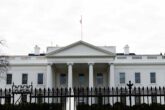January 25, 2023
Sharper: National Security in a Divided Congress
Analysis from CNAS experts on the most critical challenges for U.S. foreign policy.
Following the 2022 midterm elections, a new U.S. Congress was sworn in, resulting in a divided House and Senate with narrow margins. Key national security legislative items are up for debate, including a new defense budget that could lead to a possible government shutdown. CNAS experts are sharpening the conversation around how appropriations and approvals for policies regarding cybersecurity, Taiwan, military personnel, and aid to allies could be influenced by this divided congress. Continue reading this edition of Sharper to explore their analysis, commentary, and policy recommendations.
Features
Rebuild: Toolkit for a New American Industrial Policy
Industrial policy at scale is a new endeavor for the United States, and it must build its institutional capacity accordingly. Ad hoc efforts will not suffice, argue report authors Emily Kilcrease and Emily Jin. Expanded resources, enhanced analytic capabilities, new cadres of skilled bureaucrats, and high-level political accountability are necessary to ensure the success of a new American industrial policy, which Congress will hole a crucial role in ensuring. Robust oversight will be particularly important to build public confidence that taxpayer dollars are being spent responsibly. This report offers policymakers a toolkit of pragmatic steps to implement an American industrial policy.
What the New Congress Means for Transatlantic Relations
The beginning of 2023 was marked by significant turmoil in the House of Representatives, as Republicans struggled for nearly a week to elect a new Speaker of the House. Questions about what to expect from this Congress are relevant not only to Americans but also to our allies, including those in Europe. Peter Baker, chief White House correspondent for The New York Times, and Sarah Binder, senior fellow in Governance Studies at the Brookings Institution, join Andrea Kendall-Taylor and Jim Townsend to break down the short- and long-term implications of the events in Congress as well as how Europeans should view the situation in the U.S.
Rebuild: Toolkit for a New American Industrial Policy
As economic security comes to the forefront of U.S. foreign policy, the U.S. strategy has been largely reactive and focused on playing defense rather than offense. Actions hav...
What the New Congress Means for Transatlantic Relations
To continue our “New Year” series on Brussels Sprouts, we turn our attention to recent events in the United States Congress and their implications for the transatlantic relati...
Spyware and Security with Congressman Jim Himes
Authoritarian states are ramping up the use of foreign commercial spyware to advance digital authoritarianism, both in their own national contexts and across borders. Recent reports have warned that these sophisticated tools are likely being used to target journalists, activists, and government officials, including U.S. personnel serving overseas. To discuss this acute national security concern, the Center for a New American Security hosted Congressman Jim Himes (D-CT) for a moderated discussion on the actions the U.S. Congress is, and should be, taking.
Protecting the Protectors: Preventing and Mitigating Domestic Violent Extremism in the Military, Veteran, and Law Enforcement Communities
An emphasis on countering domestic violent extremism within the military, law enforcement, and veteran communities is not new, but in the wake of the January 6, 2021, attack on the U.S. Capitol, renewed attention to the issue gave rise to incremental changes to policies and practices within the professions, write authors Carrie Cordero, Katherine Kuzminski, Josh Campbell, and Arona Baigal in a recent CNAS report. They write, "initiatives within the executive branch (particularly the DoD) to address DVE within the military have been met with pushback from some members of Congress who cite the efforts as wasteful." The report aims to move the public debate forward by proposing a set of recommendations for military and law enforcement communities to assist in developing initiatives to prevent and mitigate against DVE.
Special Event | Spyware and Security with Congressman Jim Himes
Martijn Rasser, Alexandra Seymour, Congressman Jim Himes
Nov 17, 2022
Protecting the Protectors: Preventing and Mitigating Domestic Violent Extremism in the Military, Veteran, and Law Enforcement Communities
In recent years, the involvement of currently serving military members and law enforcement officers, as well as veterans of those two professions, in domestic violent extremis...
Commentaries
Congress, TikTok, and Securing Democracy in the Digital Age
"In recent weeks, Congress has asserted itself in the TikTok debate by passing legislation that bans the app from federal government devices," writes Pablo Chavez in Lawfare. "Another bipartisan bill, known as the ANTI-SOCIAL CCP Act, would go much further by completely prohibiting TikTok from operating in the United States. With these actions, Congress is taking on more responsibility in deciding the short-form video sharing service’s future. Given the potentially massive impact of whether the app is allowed to continue operating in the U.S., Congress’s engagement and action in this matter are welcome and necessary to help steer—at a critical moment—the direction of the still-evolving U.S. technology strategy toward China."
Decoupling Wastes U.S. Leverage on China
"The Biden administration’s aggressive new semiconductor export controls put this principle into practice, aiming to stop Chinese chip development in its tracks," observes Paul Scharre in Foreign Policy. "Yet key elements of the policy are likely to backfire. Semiconductors, or computer chips, are vital to the global economy today, and trends in machine learning suggest they are poised to become an even more vital strategic resource in the future. Recent supply-chain shortages have highlighted semiconductors’ importance, and in August Congress passed $52 billion in subsidies to re-shore semiconductor manufacturing to the United States. Yet chips are more critical than most policymakers or CEOs realize. Computing hardware is one of four key battlegrounds, alongside data, talent, and institutions, that will determine which countries lead an AI-driven future."
On Ukraine Aid, Republicans Should Follow the Leader
"December’s surprise visit of President Volodymyr Zelensky to the United States—the first time he has left Ukraine since Russia’s invasion—should make the Russians shake in their boots," argues Heather Nauert in The Hill. "As Ukrainians dig in for a long winter defending their lives and their country, the true solidarity between the United States and our ally—as Congress approved significant additional aid—has been demonstrated in ways that historians will write about for years to come. Zelensky’s visit fully underscored why this additional security, economic and humanitarian assistance for Ukraine in the recent omnibus package that was signed into law is so essential, not just for Ukraine, but for our own national security and way of life."
Congress, TikTok, and Securing Democracy in the Digital Age
A review of TikTok would also allow Congress to ask questions about and signal positions on some deeply important yet not often debated questions stemming from the separation ...
Decoupling Wastes U.S. Leverage on China
The ability to deny China access to advanced chips is a powerful advantage whose value is growing exponentially...
On Ukraine aid, Republicans should follow the leader
A robust foreign policy is critical to saving lives and in turn creating allies....
In the News
Featuring commentary from Emily Kilcrease, Stacie Pettyjohn, Martijn Rasser, Jonathan Lord, Alexandra Seymour
US Senate Votes to Ban TikTok on Government Devices
Biden administration officials are trying to determine if there is a way to create a corporate structure that would allow TikTok to operate in the US, but with protections tha...
Biden’s Midterm Report Card
"The Biden and Trump administrations both identified allies and partners as a pillar of U.S. strategy. But unlike its predecessor, the Biden team is delivering. In Europe, it ...
Biden Is Touting a Multibillion-Dollar Chip Factory in Arizona as a Way to Save the Global Economy from China Threats
The bottom line: Despite being the largest foreign direct investment in US history, the Arizona plants are unlikely to protect the US economy from the risk of a Chinese invasi...
Hard-Line House Republicans Set Up Fight over Military Budget, Pentagon ‘Wokeism’
Some Republicans have tamped down concerns that any belt-tightening will affect the military and some experts say the chances of Congress passing a slimmed down national secur...
China Is the World’s Biggest Face Recognition Dealer
In recent years US lawmakers and presidents have expressed concern that China is gaining an edge over the US in AI technology. The report seems to offer hard evidence of one a...
Thank you for registering! You will receive a confirmation email shortly. All CNAS events are free, open to the public, and viewable from cnas.org/live.
Stay up-to-date with report releases, events, major updates, and announcements from the Center for a New American Security.
More from CNAS
-
Securing U.S. Democracy Initiative
Schedule F: An Unwelcome ResurgenceThe U.S. government is able to take on high-risk, high-cost ventures—nuclear security, pandemic response, environmental clean-up, food safety, and more—because civil servants ...
By Loren DeJonge Schulman
-
Securing U.S. Democracy Initiative
Western Hemisphere Migration is a Long-Term ChallengeAddressing western hemisphere migration should be a national and international priority....
By Carrie Cordero & Cris Ramón
-
Securing U.S. Democracy Initiative
The Lawfare Podcast: Klein and Cordero on the Latest FISA NumbersTo discuss the latest in FISA transparency news, the data and what it all means, Benjamin Wittes sat down on Lawfare Live with Carrie Cordero of the Center for a New American ...
By Carrie Cordero
-
Securing U.S. Democracy Initiative
Opportunity to Reform the Department of Homeland Security’s Biodefense Operations and GovernanceIf Russia were to engage in biological warfare against Ukraine, that act could embolden other countries to develop and use such weapons in other conflicts....
By Carrie Cordero & Asha M. George
















